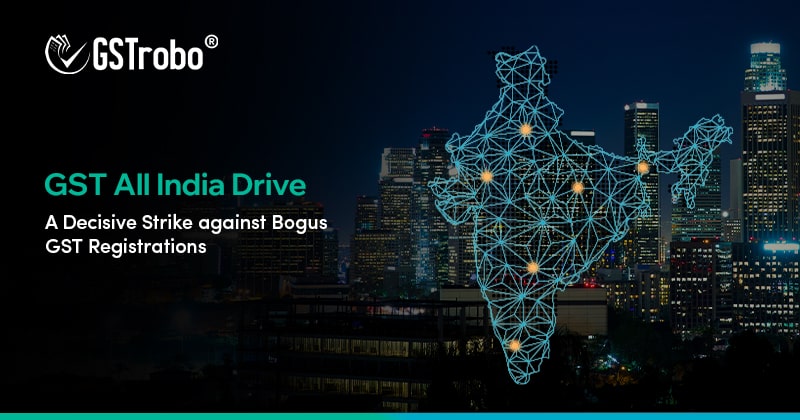GST All India Drive: A Decisive Strike against Bogus GST Registrations
The advent of Goods and Services Tax (GST) in India was a move to streamline the taxation system and induce transparency. However, every system is prone to exploitation. GST authorities faced a lot of problems and challenges, but among all the major challenges, one was the issue of fake GST registrations.
These fraudulent businesses led to many losses for the government as well as creating an uneven flow of money due to fake transactions. In response, the government decided to launch a nationwide drive to combat fake GST registrations and take action against such businesses or organizations.

Understanding Identification of Fake GST Registration
A national coordination meeting of the State and Central GST officers was organized to discuss the issue of an increase in fake GST registrations to defraud the government. Bogus registrations are being used fraudulently to claim ITC by issuing invoices without the actual supply of goods. This menace of fake registrations has become a very serious problem. CBIC, in order to curb these wrongful activities, has initiated a special crusade with the help of the State government via Instruction No. 01/2023 – GST dated 4th May 2023.
There are various methods through which businesses and organizations obtain fake GST registrations. One of them is by using forged documents. These businesses use forged electricity bills, rent agreements, tax receipts, etc., to obtain GST certificates. All these forged documents as shown as proof of place of business. Apart from these, PAN and Aadhaar cards of people not having any are used. These non-holders are given some money to co-operate for generating fake documents.
Honest taxpayers bear the brunt of these malpractices, enduring cutthroat competition from businesses involved in tax evasion. This erodes their profitability and undermines their trust in the tax system, ultimately discouraging compliance with tax regulations.
Guidelines for the Pan India Drive for Identification of Bogus GST Registrations
Recognizing the gravity of the issue, the Indian government has embarked on an exhaustive pan-India drive to eradicate fake GST registrations. This comprehensive initiative seeks to identify and penalize entities complicit in fraudulent activities, fostering an equitable and transparent tax environment. The drive entails seamless coordination between government agencies, including the Central Board of Indirect Taxes and Customs (CBIC) and the Goods and Services Tax Network (GSTN).
Furthermore, the government has adopted a risk-based approach, concentrating its efforts on high-risk sectors and entities to optimize resource allocation. Regular audits and investigations are conducted to identify and penalize offenders. The penalties for fake GST registration encompass registration cancellations, blacklisting, and legal repercussions, including prosecution.
Duration of the Drive:
A Special All India Drive to identify such illicit activities is set to be launched from 16th May 2023 to 15th July 2023.
How will Bogus GST registrations be identified?
The GSTN will run data analytics and artificial intelligence technologies to identify suspicious patterns and potential instances of counterfeit registrations. Later on, the GSTN will forward the details of such suspicious accounts, jurisdiction-wise, to the concerned Central or State tax administration authorities so that the verification process is started and necessary actions are taken. In the case of Central tax authorities, the details of such accounts will be forwarded to the Directorate General of Analytics and Risk Management (DGARM). Local tax offices and enforcement agencies can also analyze data using tools like BIFA, ADVAIT, NIC Prime, and E-way analytics.
Actions to be taken by Taxpayer
All taxpayers are supposed to keep a set of all original documents like PAN, Aadhar card, Rent agreement, Electricity bill, GST certificate copy, Purchase bill copies, Sales bill copies, current account cancel cheque, etc., ready at their business place. Any unannounced visit from the GSTN officials might occur.
Apart from this, a display name board mentioning all details like the name of the firm, address, and GST number of the person registered under GST should be placed at the entry gate of all principal places of business as per Rule 18(2) of CGST Act, 2017. Taxpayers should ensure that all the places of business are registered under GST. Also, note all the GSTR-1 and GSTR-3B are filed to date.
Conclusion
The all-India drive against fake GST registration signifies a purposive march in combating tax evasion and creating a transparent and equitable tax system. By targeting fraudulent registrations, the government aims to safeguard honest taxpayers, increase revenue collections, and establish an equal platform for all businesses. Individuals and enterprises need to comprehend the ramifications of engaging in such malpractices.
